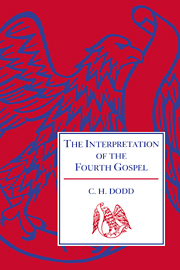Book contents
- Frontmatter
- Contents
- PART I THE BACKGROUND
- PART II LEADING IDEAS
- 1 Symbolism
- 2 Eternal life
- 3 Knowledge of God
- 4 Truth
- 5 Faith
- 6 Union with God
- 7 Light, Glory, Judgment
- 8 Spirit
- 9 Messiah
- 10 Son of Man
- 11 Son of God
- 12 Logos
- PART III ARGUMENT AND STRUCTURE
- APPENDIX: Some considerations upon the historical aspect of the Fourth Gospel
- Index Locorum
- Index Nominum
3 - Knowledge of God
from PART II - LEADING IDEAS
Published online by Cambridge University Press: 10 December 2009
- Frontmatter
- Contents
- PART I THE BACKGROUND
- PART II LEADING IDEAS
- 1 Symbolism
- 2 Eternal life
- 3 Knowledge of God
- 4 Truth
- 5 Faith
- 6 Union with God
- 7 Light, Glory, Judgment
- 8 Spirit
- 9 Messiah
- 10 Son of Man
- 11 Son of God
- 12 Logos
- PART III ARGUMENT AND STRUCTURE
- APPENDIX: Some considerations upon the historical aspect of the Fourth Gospel
- Index Locorum
- Index Nominum
Summary
We seem now to have fixed, provisionally, pending the investigation of related concepts, the sense in which the Fourth Evangelist uses the term ω. He means by it life perfect and absolute, timeless in quality and therefore exempt from death. He conceives it as possible for men here and now, but to be realized in its fullness beyond the grave.
Such life for men consists in the knowledge of God: ατηη έστιν ήαώνιō, ωή,να γινώσκων σε τòν óνōν ληθνòν θεóν(xvii. 3). After our study of Philo, the Hermetica, and Gnosticism, we need only recall that the evangelist, in enunciating this maxim, is putting his teaching in line with a religious tendency dominant in his time over a wide area. His readers would recognize in him one more teacher who set out to do for his readers what the mysteries offered to do for their initiates, to lead them to such supernatural knowledge as should confer immortality. But this does not in itself decide the question, what this writer meant by γγινώσκεν. τòνθεόν. Among the writers to whom I have referred there is no strict uniformity in this matter. For the Hermetists, saving knowledge is a discipline of cosmological, anthropological and theological speculation culminating in the mystical vision, which is at the same time deification. Gnosticism (in the narrower sense) has little mystical quality. For the typical Gnostic, γνσ is a quasi-scientific knowledge of that realm of being which transcends all human experience (γνσι τν ττερκōσμíων) communicated in terms of mythology—a knowledge which the soul can put to practical use when it leaves the body.
- Type
- Chapter
- Information
- The Interpretation of the Fourth Gospel , pp. 151 - 169Publisher: Cambridge University PressPrint publication year: 1953

